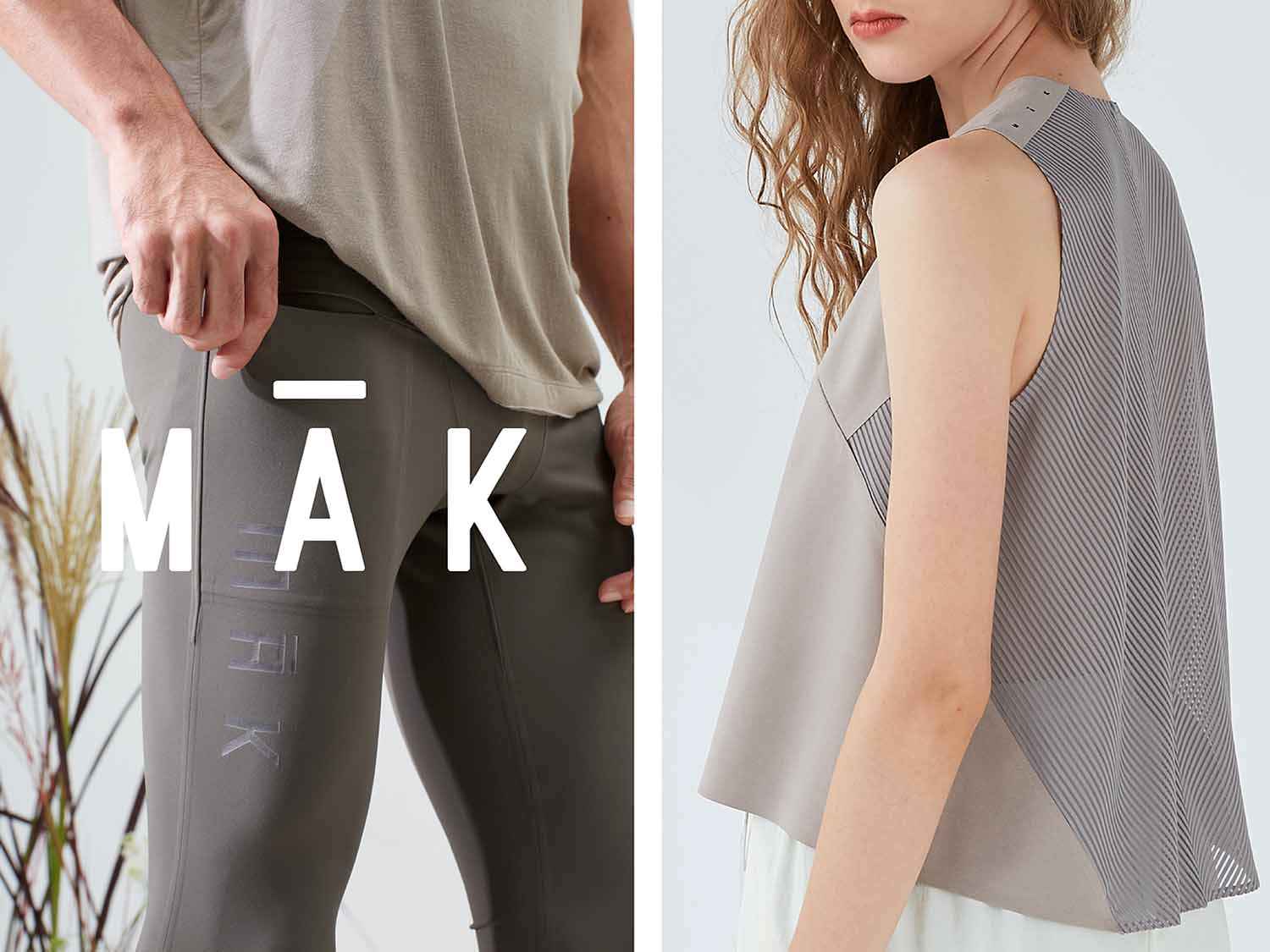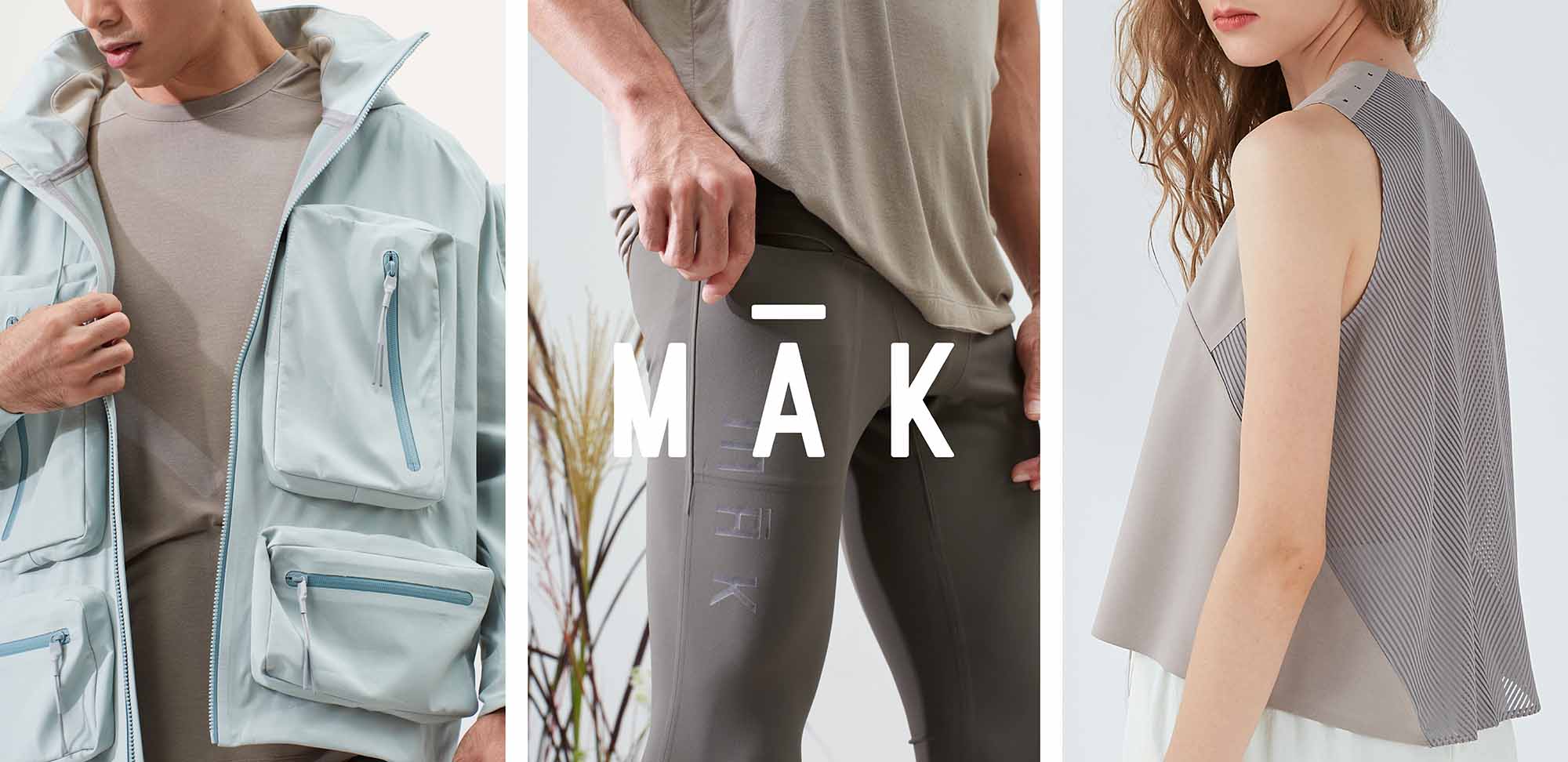
Sponsored by Makalot
Garment manufacturer Makalot is no ordinary apparel manufacturer. Based in Taiwan, a leading region in the functional textile space, Makalot is a B2B company, with both original equipment manufacturer (OEM) and original design manufacturer (ODM) capabilities – enabling it to design, develop, manufacture and sell products. Here, WTiN explores key areas of the business that make it one of the most innovative of its kind.
M Ā K: Innovation in design
Central to the company’s design and development efforts is its commitment to innovation and sustainability. Developed by a team of material engineers and “beauty lovers” with the aim of providing practical solutions “in new forms”, the team has developed M Ā K – a design series created by Makalot Associate Design House. The brand combines cutting-edge design with functionality, focusing on merging performance wear with modern lifestyle needs, the company says.
“M Ā K is absolutely connected to the word ‘make’. We targeted people who shared the same love of functional beauty and that love experimenting with new ideas.”
Makalot elaborates: “M Ā K appeals to a diverse audience, including active individuals who value both style and performance. This includes people who lead dynamic lives through outdoor activities, fitness, or urban commuting and who also prioritise sustainability. They are likely to be environmentally conscious, appreciate innovative design and seek to make responsible purchasing decisions.”
For Makalot, the future of material development lies in continued innovation in sustainable and functional materials. “We can expect more advanced fibres that offer enhanced performance in diverse weather conditions while also being environmentally responsible. As the demand for sustainable fashion grows, premium natural materials, circular textile systems and eco-conscious production processes will become the norm.”
The company also sees the integration of smart fabrics and textile technologies opening new possibilities for performance-enhancing materials, further blurring the line between activewear and lifestyle apparel.
With a focus on the environment, the team is now placing a greater emphasis on designing for sustainability and durability. “For example, M Ā K is incorporating replaceable components, such as the innovative zip sliders in collaboration with YKK, which allows consumers to easily replace worn-out or broken parts,” the company says. “This approach encourages consumers to repair garments instead of discarding them, reducing waste and promoting a longer lifecycle for the products.”
The company continues: “Designing with circularity in mind has definitely broadened our eyesight and has restructured our thinking process.” Makalot now works more closely with its supply partners to discover new materials and technologies, and has open discussions to ask questions such as: “Can this be a bio-based material with textured surface fabric? Can this piece be used in multiple occasions? How does the wearer repair trims when it’s not functioning to elongate the lifetime of the piece?”
As well as investigating how it can cut waste, Makalot is prioritising collaboration with suppliers and partners to continuously innovate within the textile-to-textile circular system. The company says: “This ultimately positions the brand to address the growing consumer demand for eco-friendly and durable products. By balancing innovation in both product design and manufacturing techniques, Makalot continues to lead in an increasingly competitive and eco-conscious market.”
WIIM: Breaking boundaries with smart textiles
Whilst Makalot’s core product focus is ready-to-wear, sportswear, swimwear, athleisure, sleepwear, loungewear and outdoorwear, smart textiles is fast becoming an important part of its offering.
In 2021, Makalot launched its own smart textiles brand, WIIM, a patented system that can be used to create smart textiles products. “Smart textiles must integrate various functional electronic components and modules. However, when designed as wearable products, they must still emphasise aesthetics and fashion while ensuring comfort in wear, boasting properties such as lightweight, breathable and easy to put on and take off clothing. Additionally, addressing the issue of washability is crucial for user acceptance,” explains Makalot.
The company’s goal is to become a key global integrator of smart textiles. “To achieve this, we will actively develop innovative smart textile materials and strengthen our end-to-end value supply chain through collaboration with various industries, providing our customers with more comprehensive services.
“On the market side, we will continue to monitor the latest global technological advancements and industry trends, exploring new ways to expand innovative applications across different sectors.”
The company has established long-term collaborations with Taiwan's electronics, precision manufacturing and chemical industries, as well as professional research institutions. “This enables us to provide comprehensive solutions to our customers, giving us a strong competitive advantage.”
With the integration of electronic components and textiles, product reliability and safety are critical considerations. Therefore, at the early stages of product design, Makalot says it conducts rigorous testing on all raw materials, including fibre analysis, wash shrinkage, tensile strength, conductivity and toxicity testing. It continues: “Once the final product is developed, it must undergo additional tests based on customer requirements or product characteristics, such as wash durability, flame resistance and container simulation testing, all in accordance with international testing standards.
“Internally, we even intentionally raise our testing standards to ensure higher durability. For example, we conduct 400 wash cycles to meet stricter performance requirements.”
To guarantee the quality of its final products, Makalot has also established a comprehensive quality management system. “Specifically, for medical-related smart textiles, we have implemented and obtained certification for ISO 13485:2016 Medical Device Quality Management System, ensuring that our customers can confidently entrust us with their product development and manufacturing needs.”
Sustainability standards can also be a challenge in the smart textiles sector, but Makalot aims to make use of waste materials for its products. The company explains: “Environmental sustainability in textiles & apparel is one of the most critical issues today. Therefore, when designing and developing smart textile products, we prioritise the use of recycled and repurposed textile materials. Additionally, the special conductive materials we use are developed with a focus on low water consumption, low energy consumption and non-toxic manufacturing processes.”
For example, its conductive films are primarily composed of nanocarbon materials, graphene and hydrophilic TPU, ensuring an eco-friendly and non-toxic production process. However, the company says the end-of-life and lifecycle of products is a primary concern: “The most crucial aspect is: how can we enhance the durability of the final product? By effectively extending the product’s lifespan and usage cycles, we can reduce the need for frequent replacements, thereby minimising waste. This commitment to durability and sustainability remains a long-term goal for our team.”
Portal:M: Exploring the phygital world
In line with its smart textile developments, Makalot is also focusing on a much wider digital transformation – by elevating the industry to a ‘phygital’ (a portmanteau of physical and digital) world. For this, the company developed Portal:M – a platform focused on driving digital transformation within the fashion & textile industry. “Our mission is to seamlessly bridge digital design, physical production and phygital experiences, empowering brands, manufacturers and independent designers through advanced 3D technology,” the company says.
Portal:M's core services include high-precision garment and textile digitisation, immersive brand storytelling, intelligent interactive experiences and dynamic virtual showrooms.
Makalot continues: “Portal:M is dedicated to accelerating product development, reducing waste, optimising supply chain collaboration and building a sustainable and globally competitive digital fashion ecosystem.”
In this increasingly competitive landscape, where flexibility and sustainability are paramount, there is much that phygital can offer the industrial textile & apparel manufacturing industry in comparison to standalone digital and physical.
Makalot explains: “The true value of phygital is not measured by how much is done physically or digitally, but by how wisely and efficiently resources are managed to support the complex process from design to production. Phygital is about creating a seamless, intelligent workflow that achieves outcomes beyond what digital or physical solutions alone can deliver.”
For Makalot, Phygital’s key advantages are:
- Real-time design validation: enabling immediate feedback, rapid iterations and smooth transitions from concept to production – significantly reducing time, cost and waste.
- Global accessibility: allowing brands to showcase collections and collaborate worldwide without the limitations of physical presence.
- Enhanced storytelling: combining tangible products with dynamic digital narratives to create deeper emotional connections and richer brand experiences.
- Immersive and interactive experiences: enabled by VR/AR-powered showrooms and digital content that elevate how products are explored and personalised.
The company notes that phygital is not about replacing physical or digital processes, but about “optimising both to deliver superior results and maximum impact across the entire fashion lifecycle”.
For phygital to be a success, scalability is essential. “Phygital success relies on creating repeatable, efficient systems that support entire product lines, seasonal collections and global campaigns,” says Makalot. “With scalability, phygital becomes a long-term, sustainable business model – not just a one-time showcase.”
According to the company, Portal:M enables scalability through:
- Flexible subscription and project-based services that adjust to brand needs.
- Reusable digital assets like fabric libraries, avatars and environments that reduce ongoing development costs.
Integrated workflows that connect design, sampling and production, ensuring smooth operations across teams.
When it comes to the future, Makalot expects digitalisation and AI-generated content to play a major role across every stage of the fashion lifecycle, from design and development to production and retail within the next decade. “The industry is likely to evolve into a seamless phygital ecosystem where digital and physical processes work together intelligently to maximise efficiency and creativity,” the company says.
Potentially, the future of fashion may include, according to the Portal:M team at Makalot:
- Full digital-physical integration, with collections potentially launching simultaneously across physical stores, online platforms, and immersive virtual environments.
- Sustainability becoming the standard, as 3D digital samples replace most physical prototypes and on-demand production helps reduce waste.
- AI-assisted creativity, where designers collaborate with AI for trend forecasting, automated design generation, and delivering highly personalised products at scale.
- Global, real-time commerce, enabled by virtual showrooms, metaverse retail and borderless collaborations.
- Experience-driven branding, where immersive storytelling and emotional engagement become central to building strong, lasting relationships with consumers.
“Portal:M is already laying the groundwork to help brands succeed in this anticipated future—one defined by full digitisation, AI-powered innovation and sustainable growth,” the company concludes.
Meet the team
Makalot will be exhibiting at the Functional Fabric Fair in Portland, US from 14-16 April 2025. The company will be showcasing its recent innovations, including Portal:M; its WIIM technology and its latest M Ā K concepts.
Visit Makalot at Stand 2239 and/or contact Vanessa Chou: vanessachou@makalot.com.tw.
Have your say. Join the conversation and follow us on LinkedIn






